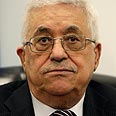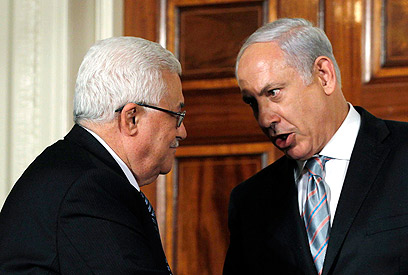
Mahmoud Abbas
צילום: AP
Abbas: Netanyahu most rigid of Israeli leaders
Palestinian leader says Israeli prime minister last on list of Israeli leaders with whom deal could be reached; claims he was heavily pressed to abandon UN bid, even by some Arab nations
After the battle at the UN, Abbas continues to attack Netanyahu: Speaking to the London-based Arab daily Asharq al-Awsat, the Palestinian Authority president ranked the Israeli prime minister last among Israeli leaders with whom he could strike a peace deal.
"Regrettably, Benjamin Netanyahu would come in last since he holds tough and almost ideological positions. He is the most rigid of Israeli leaders I have met starting with Yitzhak Rabin, Shimon Peres, Ariel Sharon, Ehud Olmert and Tzipi LIvni," Abbas said during his trip back to Ramallah from the UN General Assembly in New York.
Related stories:
- Abbas says time to review Oslo Accords
- Abbas says likely to reject Quartet's proposal
- Op-ed: Abbas’ Arafat-style speech
Abbas (left) and Netanyahu (Photo: Reuters)
During the interview, the Palestinian leader described the days preceding his statehood bid submission, saying that many European countries and even some Arab nations pressed him to abandon his full UN membership request to the Security Council.
Regarding the framework presented by the Quartet to return to negotiations, Abbas refused to say whether he approved of it, stating only that the Palestinian leadership would examine it in Ramallah.
He stressed that the Palestinians would be willing to examine any initiative, but would not discuss offers that fail to mention the 1967 borders and a halt to settlement construction.
Speaking to journalists on his plane back from New York, Abbas suggested that he was likely to reject the Quartet's peacemaking blueprint, saying he would not agree to any proposal that disregarded the Palestinian conditions for a resumption of peace talks.
He added that the Palestinian Authority wants to open the 1994 Paris Protocols – the financial addendum to the Oslo Accords – for review.
"The (current) arrangement is unfair and has articles which are keeping the Palestinian economy from stabilizing," he said, adding that the agreement "prevents land development… We aim to become independent of external (financial) assistance."
- Follow Ynetnews on Facebook
- Receive Ynetnews updates directly to your desktop











